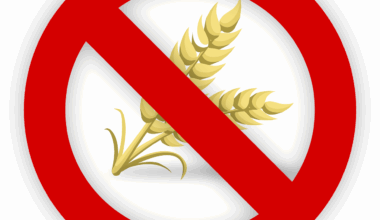Natural Sugars vs. Added Sugars: Effects on Weight
Understanding how sugars impact weight is crucial for anyone looking to lose weight effectively. Sugar can be a significant contributor to unwanted weight gain, but not all sugars are created equal. Natural sugars, found in fruits and vegetables, are accompanied by fibers and nutrients that support a healthy metabolism. On the other hand, added sugars, which are common in processed foods, often add empty calories without nutritional value. These sugars can lead to excess calorie consumption, promoting weight gain. Analyzing the effects of these sugars helps clarify the weight loss journey, providing valuable insights into dietary choices. For effective weight management, focusing on sources of natural sugars, such as whole fruits, is advantageous. Foods high in added sugars like candy, soft drinks, and baked goods should be limited. People must be cautious about sugar intake, as understanding its sources and connections to weight is vital. Recognizing the difference between natural and added sugars is a critical component of a successful weight loss strategy. Taking proactive steps to reduce added sugar consumption can ultimately lead to healthier eating habits and sustainable weight control.
Natural sugars are generally found in whole foods, providing a beneficial pathway for nutrition. When considering a weight loss program, it’s essential to prioritize these sugar types. Fruits and vegetables are rich in vitamins and minerals that contribute positively to health. Furthermore, the fiber in these foods helps in digestion. In contrast, added sugars lack these nutritional benefits and contribute to metabolic issues when consumed excessively. Hence, an awareness of where sugar is sourced can significantly influence dietary decisions. For instance, sugary drinks, such as sodas and energy drinks, often contain high amounts of added sugars that detract from daily nutritional needs. Reducing intake of these beverages is critical for weight loss efforts. Instead of sugary snacks, opting for fruit as a snack fulfills a sweet craving while offering health benefits. Nutrition labels can help people identify added sugars in products. Utilizing this information allows individuals to make informed choices. Reducing added sugars will not just facilitate a faster way to lose weight but also enhance overall health. Making these adjustments in sugar consumption habits is crucial for long-lasting effects on body composition and weight management.
The Role of Insulin in Weight Management
When sugars are consumed, they lead to increased blood sugar levels, prompting insulin secretion. Insulin is a hormone that regulates sugar in the bloodstream, facilitating its use for energy or storing it as fat. High intake of added sugars causes a spike in insulin levels, which contributes to fat storage. Consequently, a diet rich in added sugars can lead to obesity. Developing a strong understanding of this process is important for weight loss strategies. Insulin resistance, which can result from excessive sugar intake, complicates weight management further. Elevated insulin levels can induce hunger, pushing people to seek more food and thus, more calories. By limiting added sugars, one can stabilize insulin levels, reduce hunger, and promote fat burning. In contrast, complex carbohydrates and natural sugars promote a gradual release of glucose, avoiding drastic insulin spikes. This balance prevents excess weight gain and promotes sustainable weight loss. Moreover, healthy glycemic control not only aids weight management but also enhances overall health. Thus, controlling sugar intake can foster metabolic health, leading to a more successful weight loss outcome.
Aside from insulin impacts, understanding how sugars affect cravings and energy levels is essential. Natural sugars, unlike added sugars, provide a stable energy source due to their fiber content. This allows for better control over energy levels throughout the day. In contrast, foods laden with added sugars can lead to energy spikes, followed by crashes that result in cravings for more sugar. This cyclical behavior can hinder weight loss efforts, creating an ongoing struggle against unnecessary calorie intake. For effective weight management, it is vital to maintain stable energy levels. Consuming balanced meals that include natural sugars, proteins, and healthy fats can promote satiety and sustained energy. Having regular, balanced meals prevents the kind of hunger that leads to impulsive eating of sugary snacks. Additionally, planning meals and snacks around whole foods that contain natural sugar can help curb cravings effectively. Making informed choices regarding sugar intake and meal planning are essential strategies within any successful weight loss program. Individuals looking to shed pounds should focus on these strategies to avoid pitfalls associated with added sugars.
Identifying Hidden Sugars
One significant challenge when managing sugar intake lies in identifying hidden added sugars in common foods. Many processed items, including bread, sauces, and dressings, contain added sugars that are often overlooked. To achieve successful weight loss, individuals must become adept at reading nutrition labels. Hidden sugars can easily increase total calorie consumption without providing substantial nutrients. Understanding various names for added sugars, such as high-fructose corn syrup, sucrose, or dextrose, equips individuals in making healthier choices. These ingredients frequently appear in foods marketed as healthy, making them hard to avoid. Furthermore, even items labeled ‘sugar-free’ can contain artificial sweeteners that might counteract weight loss goals. Choosing products with little to no added sugars can significantly minimize calorie intake. Advocating for whole, unprocessed foods enables a lifestyle shift that promotes health. Ingredients lists and nutritional information are essential tools in this evaluation process. Examining these helps in differentiating beneficial food items from those that may sabotage weight loss efforts. Ultimately, increasing awareness around hidden sugars will allow individuals to align their nutritional choices with their fitness goals.
In summary, the ongoing debate of natural sugars versus added sugars is vital for understanding weight loss strategies. Emphasizing the consumption of natural sugars can support weight management and overall well-being. For individuals committed to weight loss, focusing on nutrient-rich foods, minimizing added sugar intake, and being mindful of food labels is highly beneficial. The metabolism thrives best when fueled with adequate nutrients while avoiding excess sugar. People can enhance their dietary habits by making simple swaps, such as replacing sugary snacks with fresh fruits. Improved energy levels and reduced cravings will accompany these changes and foster lasting results. Nutrition is a crucial component in achieving a healthy weight, as it directly impacts cravings and hunger levels. Throughout the weight loss journey, adopting a lifestyle that embraces natural sugars can facilitate a more enjoyable and fulfilling experience. Ultimately, balance is key. While sugar may seem omnipresent in our diets, prioritizing the quality of the sugar consumed can yield positive results in achieving fitness goals. Understanding the importance of sugar choice transforms the approach toward weight loss.
Creating Lasting Changes
Adopting a sustainable approach to sugar intake involves more than just making brief dietary changes. Weight loss is a journey that requires commitment and persistence. Establishing long-term habits surrounding sugar consumption can lead to improved health outcomes. Consistency in choosing natural sugars and being aware of hidden added sugars is essential in this process. Educating oneself on the different effects of sugars will further support healthy decision-making. In addition, surrounding oneself with supportive communities that share similar health goals can enhance motivation. Setting achievable goals related to sugar intake and measurement can facilitate ongoing assessment of progress in weight management. Instead of viewing these changes as restrictions, people should embrace them as opportunities for better health. Meal planning, preparation, and mindful eating are critical strategies to implement these long-term lifestyle changes effectively. These practices allow individuals to navigate dining choices without feeling overwhelmed. Keeping track of nutritional choices helps celebrate milestones along the way. As one embarks on the path to weight loss, understanding the role of sugars will remain crucial in achieving lasting success and comprehensive well-being.
The journey towards effective weight management necessitates a practical understanding of sugars and their implications. Natural sugars, when incorporated thoughtfully, can complement weight loss efforts. However, being cautious about added sugars enhances this process significantly. This article underscores the importance of not only recognizing sugars but also adapting dietary practices and mindsets towards these components. Individuals equipped with knowledge about sugar and its effects will be more successful in their weight loss journeys. The aim should never merely be to reduce numbers on a scale but to foster a healthier relationship with food. Overall, balancing sugar intake with essential nutrients holds the key to achieving optimal health. Sustaining a lifestyle that prioritizes natural sugars, along with their accompanying benefits, can lead to long-lasting changes. Dedicating oneself to understanding dietary choices will bolster confidence in managing weight effectively. Thus, the insights herein serve as a foundation for those planning a successful weight loss strategy. By embracing these principles, individuals can pave a pathway to achieving their ideal weight and living healthier lives.





